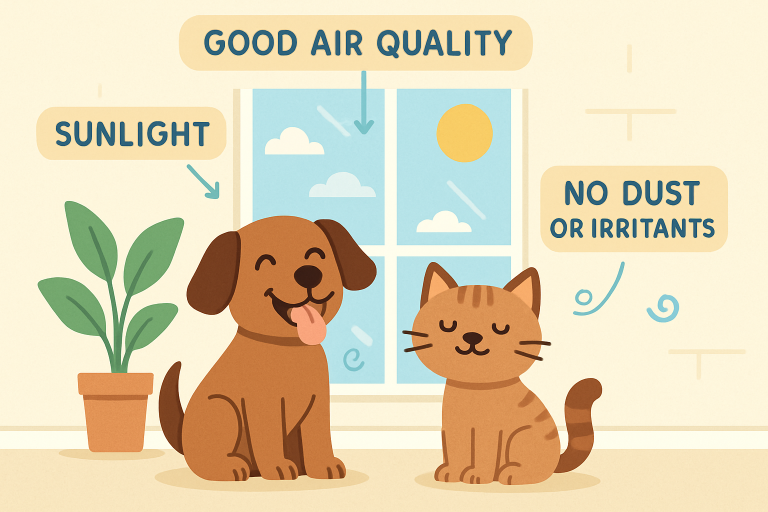Pets, like people, are susceptible to respiratory symptoms such as coughing and sneezing, which can be distressing for both animals and their owners. These symptoms often indicate underlying issues that, if left unaddressed, can impact your pet’s long-term health. Taking proactive steps to prevent these problems is just as important as knowing how to respond when they occur. For a deeper dive into common issues like dog sneezing, it’s helpful to understand both the triggers and best preventive practices.
Pet owners can reduce their pets’ risk of discomfort and illness by recognizing common triggers and adopting effective prevention measures. Early detection and intervention are crucial for pet wellness. Signs like coughing and sneezing can indicate mild triggers, such as dust, or serious problems, like infections or heart disease. Staying informed about common triggers and minimizing exposure are essential.
Common Causes of Coughing and Sneezing
Coughing and sneezing in pets can result from a range of sources. Pinpointing the root cause enables better prevention and more effective, targeted care. These symptoms may develop suddenly or persist over time, depending on the pet’s underlying health and exposure to various irritants.
Allergies
Allergies are one of the most common triggers for coughing and sneezing in both dogs and cats. Pets can be allergic to pollen, dust mites, mold spores, certain foods, and even some fabrics or cleaning agents. Allergy symptoms typically include frequent sneezing, coughing, itching, excessive grooming, and a runny nose or eyes. Controlling exposure to potential allergens and being vigilant about changes in your pet’s environment can help reduce allergic reactions. Addressing allergies promptly can lessen the risk of respiratory issues.
Respiratory Infections
Viral and bacterial infections are frequent culprits of sudden coughing or sneezing in pets. Dogs are particularly prone to conditions such as kennel cough (caused by Bordetella bronchiseptica), canine parainfluenza, or canine adenovirus, while cats may contract feline calicivirus or herpesvirus. Such infections often spread in environments where many animals are in close proximity, such as boarding facilities or dog parks. Symptoms typically include respiratory distress, nasal discharge, and decreased appetite. Ensuring that pets are up to date on recommended vaccinations is critical for prevention and reduced severity of these infections.
Environmental Irritants
Airborne irritants found in homes, such as tobacco smoke, aerosol sprays, scented candles, and harsh cleaning products, can trigger respiratory reactions. Dust, strong perfumes, and excessive household dander also pose risks, particularly for animals with sensitive airways. Improving household air quality by regularly cleaning floors, filtering indoor air, and using hypoallergenic cleaning agents can dramatically reduce your pet’s exposure to these irritants. Maintaining proper ventilation is vital, especially in areas where pets spend most of their time.
Heart Disease
While less common than allergies or infections, heart disease can be an underlying reason for chronic coughing, especially in older pets. Dogs with heart conditions may cough more at night or after mild activity, and their coughing may sound wet or harsh. These symptoms are caused by fluid accumulation in the lungs or pressure on the airways. If your pet develops persistent coughing that doesn’t resolve with simple interventions, a thorough veterinary assessment is required. Early detection of cardiac disease can result in better management and improved outcomes.
Preventive Measures
- Regular Veterinary Visits: Scheduling routine exams helps catch early signs of health problems before they progress.
- Up-to-date Vaccinations: Ensure all core and recommended vaccines are current to reduce the risk of infectious diseases.
- Maintain a Clean Environment: Use vacuum cleaners equipped with HEPA filters and mop hard surfaces frequently to minimize allergens.
- Healthy Diet: Feed a high-quality, species-appropriate diet to boost overall immunity and resistance to infections.
- Exercise and Enrichment: Encourage daily activity tailored to your pet’s needs to keep respiratory muscles healthy and improve cardiovascular function.
Additional Preventive Tips
- Groom pets regularly to remove dander and prevent buildup of allergens.
- Avoid using strong chemicals or fragrances where pets spend most of their time.
- Pay attention to seasonal changes that may increase allergy symptoms, such as higher pollen counts in spring and fall.
When to Consult a Veterinarian
If your pet’s symptoms last more than a few days, worsen over time, or are accompanied by labored breathing, lethargy, or loss of appetite, it’s critical to seek prompt veterinary evaluation. Persistent or recurring coughing and sneezing can be signs of more serious conditions that require immediate treatment. Pets with underlying medical conditions—such as seniors or those with chronic illnesses—are particularly vulnerable and should be assessed without delay.
Conclusion
Coughing and sneezing in pets can stem from many causes, ranging from mild irritants to serious health issues. By maintaining regular veterinary care, keeping their environment clean, and watching for early warning signs, pet owners can significantly reduce risks and ensure their furry companions stay happy and healthy. Staying proactive and informed is the best way to support your pet’s long-term respiratory health.

